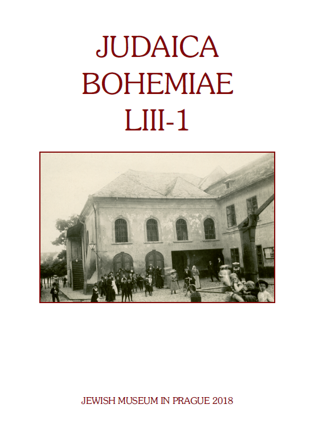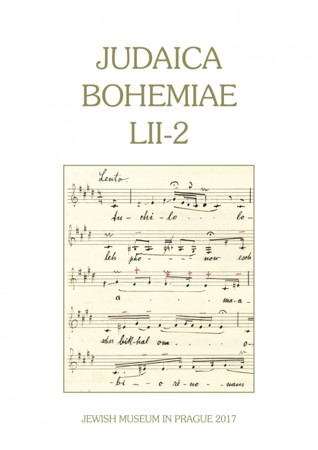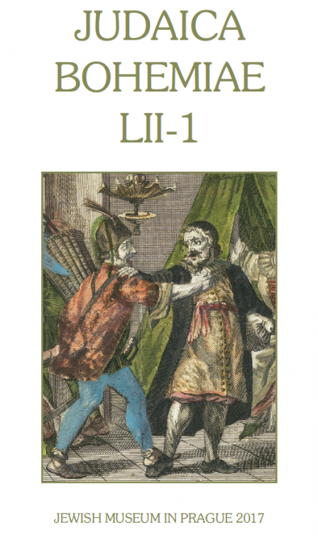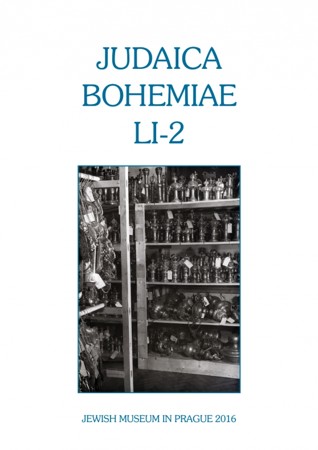Judaica Bohemiae
Judaica Bohemiae is a scholarly peer-reviewed journal that has been published by the Jewish Museum in Prague since 1965. Originally
a biannual journal, it came out annually in 1994–2008, and twice yearly in 2009–2022. As of 2023, it is once again an
annual publication. Articles are published in English and German. The journal is included in the Arts and Humanities Citation
Index (Web of Science), Scopus, and the European Reference Index for the Humanities and Social Sciences (ERIH PLUS).
Judaica Bohemiae focuses on the history and culture of the Jews in Bohemia, Moravia, Silesia and other countries of the former
Habsburg Monarchy from the Middle Ages through to the present. It features original scholarly papers in its regular sections
‘Studies and Articles’, ‘Documents’, ‘Reports’ and ‘Reviews’. To be included in the main sections – ‘Studies
and Articles’ and ‘Documents’ – papers must be evaluated by an independent peer-review process. Accepted are original
studies and material studies of between 25 and 45 standard pages focusing on various aspects of Jewish history in the Bohemian
lands or the wider Central European region, which provide new information, perspectives, theoretical approaches and assessments,
and which successfully contextualize specific topics within existing research and within broader perspectives on the development
of the entire society. Papers that apply modern historical approaches and connect different disciplines are welcome. To be
included in the ‘Reports’ and ‘Reviews’ sections, contributions must be evaluated and accepted by the journal’s
editorial board. The ‘Reports’ section features contributions that draw attention to important research projects, exhibitions
and conferences, while the ‘Reviews’ section focuses on important scholarly publications relating to the thematic focus
of the journal.
Judaica Bohemiae can be ordered directly from the publisher or through SUWECO CZ and CEEOL (Central and Eastern European Online
Library).
ISSN 022-5738 (Print)
ISSN 2571-0974 (Online)
Complete bibliography of Judaica Bohemiae
Invitation for submissions
Scholars are invited to submit studies, reports or reviews for publication in the next issues of the journal Judaica Bohemiae. Proposals and inquiries regarding contributions are received and dealt with by the journal’s editorial staff on an ongoing basis throughout the year. Contributions may be submitted for consideration in Czech, English or German. If a manuscript is accepted for publication, the editorial staff will arrange for it to be translated or proofread.
Judaica Bohemiae 60 (2025)
Deadlines for contributions:
| 31 March 2025 | submission of abstracts of draft papers for the main section ‘Studies and Articles’ (max. 300 words) |
| 15 June 2025 | submission of the complete papers for the main section ‘Studies and Articles’ |
| 25 June 2025 | submission of draft contributions for the ‘Reports’ and ‘Reviews’ sections |
| 30 September 2025 | submission of the complete contributions for the ‘Reports’ and ‘Reviews’ sections |
Judaica Bohemiae 61 (2026)
Deadlines for contributions:
| 31 March 2026 | submission of abstracts of draft papers for the main section ‘Studies and Articles’ (max. 300 words) |
| 15 June 2026 | submission of the complete papers for the main section ‘Studies and Articles’ |
| 15 June 2026 | submission of draft contributions for the ‘Reports’ and ‘Reviews’ sections |
| 30 September 2026 | submission of the complete contributions for the ‘Reports’ and ‘Reviews’ sections |
Contact information
Publisher: Jewish Museum in Prague
ISSN: 0022-5738
Editorial Board: Jewish Museum in Prague – Department of Jewish History and Jewish Studies
For contributors
Manuscripts should be prepared in Microsoft Word format (Times New Roman, font size 12) and emailed to the editorial board. Papers may include black-and-white illustrations, which should be sent in print quality (300 dpi) and, if necessary, with permission to reproduce them. You should also attach a brief résumé (max. 100 words) and inform the editors of your full name, title(s) and current professional position
Editorial board
Editor-in-chief
PhDr.
Iveta Cermanová , Ph.D.
Deputy editor-in-chief
PhDr.
Alexandr Putík
Members of the editorial board
- Mgr. Daniel Baránek, Ph.D. (Institute of History of the Czech Academy of Sciences)
- PhDr. Martin Borýsek, Ph.D. (Universität Potsdam, Institut für Jüdische Studien und Religionswissenschaft)
- Mgr. Pavel Kocman, Ph.D. (Society for the History of Jews in the Czech Republic)
- Martina Niedhammer, Ph.D. (Collegium Carolinum, Munich)
- PhDr. Arno Pařík (Jewish Museum in Prague)
- Mgr. Daniel Soukup, Ph.D. (Palacký University Olomouc, Institute of Czech Literature of the Academy of Sciences of the Czech Republic)
- PhDr. Magda Veselská (Institute for the Study of Totalitarian Regimes, Prague)
- Mgr. Markéta Pnina Younger, Ph.D. (Central Archives for the History of the Jewish People, Jerusalem)
Peer review process
Papers that are submitted to the journal Judaica Bohemiae for publication in the peer-reviewed section 'Studies and Articles' are first assessed by the journal’s editors or by members of the editorial board. Papers may be rejected at this stage by the editorial board if they contain major shortcomings in terms of form or content.
Papers that are accepted go through the standard peer review process, with each text being reviewed twice. The text is then made anonymous and sent to a reviewer who is selected by the editorial board with regard to the specialist focus of the text. Preference is given to external reviewers (from the Czech Republic and abroad) although, in exceptional and justified cases, they may be members of the editorial board. A paper by a member of the editorial board must be reviewed by an external reviewer.
If the reviewers differ in their assessments of a particular paper, the editorial board will decide by voting whether to accept one of the reviews or whether to send the paper out to another reviewer for a third review . After the third review is submitted, the editorial board will decide by voting whether to accept or reject the paper. The final decision is based on an absolute majority vote. The editorial board will then return all the reviews to the author with a brief statement on whether the text has been accepted, whether it needs to be revised, or whether it has been rejected.



![[subpage-banner/4_Sbirkyavyzkum_2.jpg]](https://c.jewishmuseum.cz/images/subpage-banner/4_Sbirkyavyzkum_2.jpg)




![[design/2013/Twitter.png]](https://c.jewishmuseum.cz/images/design/2013/Twitter.png)
![[design/2013/Instagram.png]](https://c.jewishmuseum.cz/images/design/2013/Instagram.png)

![[homepage-banner/incident.jpeg]](https://c.jewishmuseum.cz/images/homepage-banner/incident.jpeg)